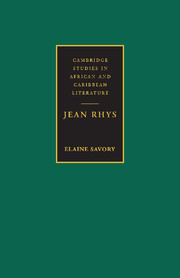Book contents
- Frontmatter
- Contents
- Preface
- Acknowledgements
- List of abbreviations and note on the text
- Chronology
- 1 Living on both sides, living to write
- 2 Registering protest: The Left Bank and Quartet
- 3 A Caribbean woman lost in Europe?: After Leaving Mr MacKenzie and the question of gender
- 4 Writing colour, writing Caribbean: Voyage in the Dark and the politics of colour
- 5 Dangerous spirit, bitterly amused: Good Morning, Midnight
- 6 People in and out of place: spatial arrangements in Wide Sargasso Sea
- 7 Brief encounters: Rhys and the craft of the short story
- 8 Performance arts: the theatre of autobiography and the role of the personal essay
- 9 The Helen of our wars: cultural politics and Jean Rhys criticism
- Notes
- Select bibliography
- Index
3 - A Caribbean woman lost in Europe?: After Leaving Mr MacKenzie and the question of gender
Published online by Cambridge University Press: 22 September 2009
- Frontmatter
- Contents
- Preface
- Acknowledgements
- List of abbreviations and note on the text
- Chronology
- 1 Living on both sides, living to write
- 2 Registering protest: The Left Bank and Quartet
- 3 A Caribbean woman lost in Europe?: After Leaving Mr MacKenzie and the question of gender
- 4 Writing colour, writing Caribbean: Voyage in the Dark and the politics of colour
- 5 Dangerous spirit, bitterly amused: Good Morning, Midnight
- 6 People in and out of place: spatial arrangements in Wide Sargasso Sea
- 7 Brief encounters: Rhys and the craft of the short story
- 8 Performance arts: the theatre of autobiography and the role of the personal essay
- 9 The Helen of our wars: cultural politics and Jean Rhys criticism
- Notes
- Select bibliography
- Index
Summary
Miss Dufreyne, for such was the Lady's name, was a weak, sentimental, very lazy, entirely harmless creature, pathetically incapable of lies or intrigue or even of self-defence – till it was too late. She was also sensual, curious, reckless, and had all her life aroused a strong curiosity in men. So much for her.
(‘In the Rue de l'Arrivée’, TLB, 1927; CSS, 1987: 51)Gradually passivity replaced her early adventurousness. She learned, after long and painstaking effort, to talk like a chorus girl, to dress like a chorus girl and to think like a chorus girl – up to a point. Beyond that point she remained apart, lonely, frightened of her loneliness, resenting it passionately. She grew thin. She began to live her hard and monotonous life very mechanically and listlessly.
(Q: 16)But on some days her monotonous life was made confused and frightened by her thoughts. Then she could not stay still. She was obliged to walk up and down the room consumed with hatred of the world and everybody in it – especially of Mr Mackenzie.
(ALMM: 12)Since Francis Wyndham observed in 1950 that Rhys heroines in After Leaving Mr MacKenzie, Voyage in the Dark and Good Morning, Midnight could be said to be similar women in different circumstances, the issue of ‘the Rhys woman’ has been alive in Rhys criticism, especially in feminist critical approaches (Baldanza 1978; Nebeker 1981; Le Gallez 1990).
- Type
- Chapter
- Information
- Jean Rhys , pp. 57 - 84Publisher: Cambridge University PressPrint publication year: 1999



